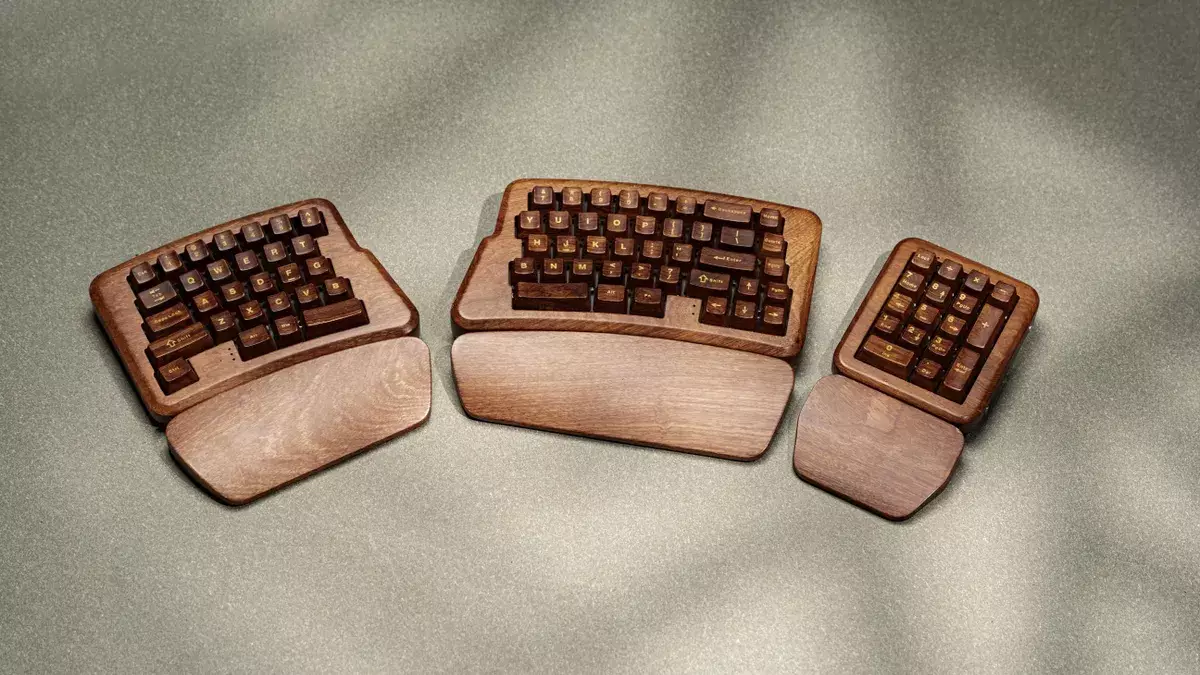In recent years, the realm of computer peripherals has witnessed an unexpected trend: the rise of wooden keyboards. The latest contender making waves among tech enthusiasts is the Epomaker x Feker Alice 60, a split ergonomic keyboard crafted entirely from wood. At first glance, it elicits a plethora of reactions, but upon deeper inspection, its value and potential drawbacks deserve thoughtful consideration.
The initial images of the Epomaker x Feker Alice 60 can be polarizing. As someone who typically approaches new products without bias, it’s interesting how visual presentations can sway our judgments before any hands-on experience. The keyboard, wrapped in what appears to be a warm wooden chassis, crafts an inviting image. But does beauty equal functionality? While the allure of a natural material in an office setting cannot be understated, one wonders if the elegance translates into usability.
Many enthusiasts are quick to extol the virtues of natural materials, touting how wood can enhance the user experience through aesthetic warmth and sound dampening. Indeed, the idea that a wooden keyboard can mimic the acoustics of a concert hall — offering a muted typing sound — is intriguing. However, a closer examination reveals that the tactile feedback of each key press may not be as satisfying as it could be when compared to traditional mechanical switches.
Ergonomics is a crucial aspect when considering any keyboard, especially one designed for prolonged use. The split design of the Epomaker x Feker Alice 60 aims to promote better hand positioning and reduce strain. Nevertheless, the preference for such a layout is highly subjective. Not all users find comfort in a split keyboard, and for some, it may introduce new challenges in spatial awareness while typing.
With an additional detachable numpad, this keyboard has implemented modern design principles that cater to various user preferences. However, one cannot ignore the associated learning curve. The transition from a traditional keyboard layout to a split format can be a daunting experience, especially for those who have developed muscle memory around conventional designs. Adding insult to injury, the also included wooden wrist rest, while aesthetically pleasing, raises concerns about long-term durability and comfort over extended periods of use.
One of the most disconcerting aspects about the Epomaker x Feker Alice 60 is its price tag — a staggering $549. In an age where competitive options exist, this price raises eyebrows. Particularly when juxtaposed with alternative ergonomic keyboards that deliver exceptional performance, such as the Kinesis Freestyle Edge RGB, which retails at nearly half the price but offers features tailored for serious gamers.
It is worth questioning what exactly contributes to the overhead of this wooden keyboard. While craftsmanship and the uniqueness of the materials play a significant role, many prospective buyers will be left wondering if they are investing in style over substance. The buzzing discussions among the gaming and tech communities reflect the inherent gamble companies take when pricing products in a niche market.
The nature of product reviews often lands in a realm of subjectivity and diverse opinions. Notably, a colleague expressed the conflicted desire to own the Epomaker x Feker Alice 60, even while holding a disdain for its design. This sentiment encapsulates the paradox that many prospective buyers may feel: recognition of the keyboard’s artisan appeal versus doubts about practicality and performance.
Critics frequently mention an “ick” factor that comes with wooden keycaps, pondering the cleanliness and maintenance compared to their plastic counterparts. I’d argue that perceptions of quality should balance aesthetics with practical usability and hygiene — two considerations that may create a rift for consumers inclined toward a natural look.
As we navigate through the intricacies of product design and user experience, the emergence of wooden keyboards like the Epomaker x Feker Alice 60 serves as a testament to the evolving landscape of computer accessories. Whether it will stand the test of time among tech enthusiasts remains uncertain. Ultimately, the decision to embrace or reject such innovations underscores one simple truth: the best keyboard is one that meets individual preferences and ergonomic needs. For now, it remains an intriguing blend of creativity and utility — and only the individual user can truly determine its worth.

